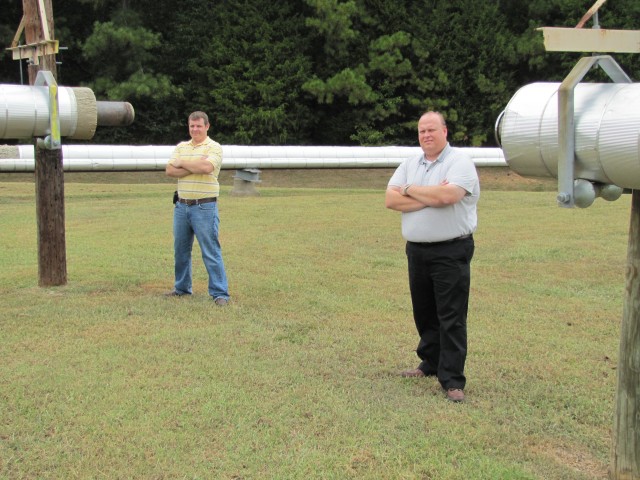REDSTONE ARSENAL, Ala. -- Imagine having to pay millions of dollars annually for utilities. That's why Redstone is trying to conserve energy.
Redstone Arsenal gets billed by the Tennessee Valley Authority about $30 million annually for electricity. Steam usage has been reduced through energy conservation projects but will still reach about an $18 million bill from Huntsville this fiscal year. And gas will represent about a $2.2 million expense.
"Energy conservation is important to help save the Army dollars," energy manager Mark Smith, of the Garrison's Directorate of Public Works, said. "And it's important - as Lt. Gen. (Rick) Lynch (the Installation Management Command commander) says -- for our children and their children."
In fiscal 2010, not counting September, Redstone was billed by TVA for more than 384 million kilowatt hours of electricity or just over $26 million. The total numbers for fiscal 2009 were more than 403 million kilowatt hours for $29.8 million.
So far this fiscal year through August, Redstone used more than 877 million pounds of steam for over $16 million. Excluding August and September, Redstone used more than 328,500 dekatherms of gas which amounts to $1.9 million.
"There's two parts to the cost. Part of it is the price of the commodity. The other part is the cost of the consumption," Smith said. "The part we're trying to control is the consumption part of it."
The keystone of this conservation effort is Redstone's utility energy savings contract with TVA.
"They come in and do energy audits for us in our facilities. And then they'll recommend feasible energy conservation measures to implement," Smith said. "And then the measures that they recommend will pay for themselves from the savings identified."
Delivery Point A, the first phase of this contract, has already been implemented in 44 buildings and other site improvements. The 15-month project, completed Feb. 23, included decommissioning about four miles of purchased steam distribution and installing new natural gas lines. The measures considered in the affected buildings included lighting retrofits, building automation, HVAC (heating ventilation and air conditioning) improvements, architectural improvements, and wall insulation. The project eliminates thermal distribution losses, building energy losses and other inefficiencies to offset the cost of the improvements. The project cost was $9.8 million with a projected savings of $1.4 million annually and a simple payback of seven years.
Delivery Point B, the next phase pending approval, will include 31 other facilities and also entail 15 months of construction.
Other ongoing conservation efforts include the Energy Engineering Analysis Program through the Engineering and Support Center, Huntsville. The Army has a metering program through the Huntsville Center which is installing advanced gas and electric meters to remotely monitor energy consumption in facilities. On the base contract, about 300 meters have been installed; and a change to this contract has added 150 meters for a total of about 450 meters. So far, 375 meters have been installed and the completion date is March 31, 2011.
Redstone has started auditing its government-owned boiler plants and is considering conservation measures in those facilities and whether it would be feasible to decentralize those plants.
"We're going to start implementing Leadership in Energy Efficient Design requirements in our local projects. They're already implemented in our Army major construction projects," Smith said. "And we're looking at our energy awareness program and we're going to develop an energy conservation marketing plan for the Redstone community."
Energy conservation for federal agencies is required by law.
"Our goal is to reduce energy consumption by 30 percent based on a (fiscal year) 2003 baseline," Smith said. "And we've got till 2015 to do it."
That goal is based on several things including executive orders, the Energy Policy Act of 2005 and the Energy Independence and Security Act of 2007.
Each worker can help by turning off unnecessary lights, shutting down computers at night, obeying the Army regulation which prohibits space heaters, and limiting use of individual refrigerators. To correct a problem of energy waste, call the minor service order desk at 876-2801.
"For Redstone and the Army it's saving taxpayer dollars," Patrick Holmes, who does quality assurance and engineering in Smith's energy management office, said. "It's also helping the Army meet their goals that the government has put out for them."


Social Sharing